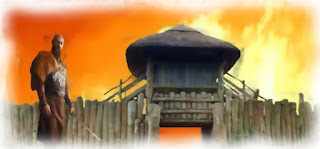HAMMER
The Iron Between
by Micheál Cladáin
Publication Date: January 31st, 2023
Publisher: PerchedCrowPress
Pages: 375
Genre: Historical Fiction
Genonn’s tired and dreams of a remote roundhouse in the Cuala Mountains.
However, sudden rebellion in Roman Britain destroys that dream because the Elder Council task him with delivering Lorg Mór, the hammer of the Gods, to the tribes across the straits of Pwll Ceris. Despite being torn between a waning sense of duty and his desire to become a hermit, Genonn finally agrees to help.
When his daughter follows him into danger, it tests his resolve. He wants to do everything he can to see her back to Druid Island and her mother. This new test of will means he is once again conflicted between duty and desire. Ultimately, his sense of duty wins; is it the right decision? Has he done the right thing by relegating his daughter’s safety below his commitment to the clans?
Provide the setting for Hammer
Hammer covers a wide area of land, from Ireland across the Irish Sea to Anglesey (Mona). And then across the Menai straits to Wales and England. When the Main Character, Genonn, reaches the mainland across the fords of Pwll Ceris, he goes to the stone fortress at Tre’r Ceiri before heading towards Colchester (Camulodunum) on the opposite coast of mainland Britain (Alba).
Note: Mainland Britain was originally known as Alba (to the natives). It became synonymous with Scotland when Kenneth I united the Scots and the Picts in 843 CE, creating the kingdom of Alba.
But how does all that fit with historical events that occurred almost 2000 years ago in CE 60/61?
During the latter half of the first century, Ancient Celts believed in magical weapons, Faeries, the Tuatha De Danaan. They believed in a land of eternal youth, Tír nÓg, where King Áedh ruled. It was a time shortly after Christ’s crucifixion. A time when the words of the prophet were—not so much written on subway walls as starting to spread throughout Europe. It was a time when Rome finally managed to gain a foothold in Britain after the invasion of Claudius’s legions. It was a time when the druids might have sent a supposed Hammer of the Gods to support a queen in her efforts to throw off the Roman yoke. A time when the clans should have forgotten their internecine squabbling and used that symbology to help them unite in the face of a common enemy. Instead, when Boudica rebelled, she had the support of only one other clan, the Trinovantes.
I am not one to complain. Bad judgement on the part of the Ancient Celts makes for great material. As a novelist, I need conflict. What better than Britain’s clans fighting among themselves, thereby allowing the wolves through the door? And when the conflict is external, there needs to be an antagonist. I found mine in one of the other clans, one that did not support Boudica’s rebellion, the Ordovices from what is now known as North Wales. And, of course, conflict is increased when a warrior suspected of murder is the bodyguard of the Main Character.
As well as conflict, I also need intrigue. What is more intriguing than Gaius Suetonius Paulinus ordering the Fourteenth Legion west when the east was about to erupt in rebellion?
Agricola was certainly intrigued—at least in my version of events, which is not much of a stretch. The young, banded tribune, was seconded to the staff of Suetonius at the time of the uprising. Tacitus tells us Agricola was a philosopher, a thinker, so he must have been suspicious about the invasion of Mona when the threat was evidently in the east. Tacitus also tells us Agricola had a sound military mind and was a man of honour. So, for my story, I have conflict, intrigue, and another POV to balance that of Genonn.
Hammer covers a wide area of land, from Leinster in Ireland to Colchester in the east of England, but it also covers a spectrum of themes and emotions: love; betrayal; heroism; cowardice; the effectiveness of symbolism; to name but a few. And, of course, slaughter. Lots and lots of slaughter.
 |
| (c) Phil Hughes. All rights reserved. |
Londinium’s burning, Londinium’s burning.
Fetch the buckets, fetch the buckets.
Fire fire, fire fire!
Pour on water, pour on water.
Hammer is available on #KindleUnlimited.
Micheál Cladáin
Micheál has been an author for many years. He studied Classics and developed a love of Greek and Roman culture through those studies. In particular, he loved their mythologies.
As well as a classical education, bedtime stories consisted of tales read from a great tome of Greek Mythology, and Micheál was destined to become a storyteller from those times.
Connect with Micheál:











No comments:
Post a Comment